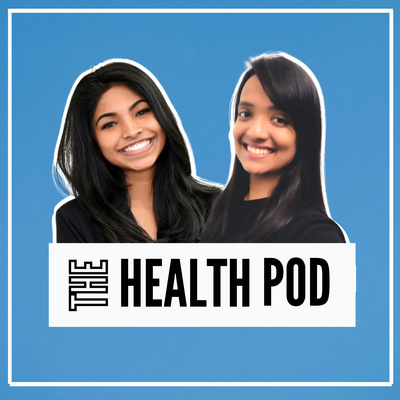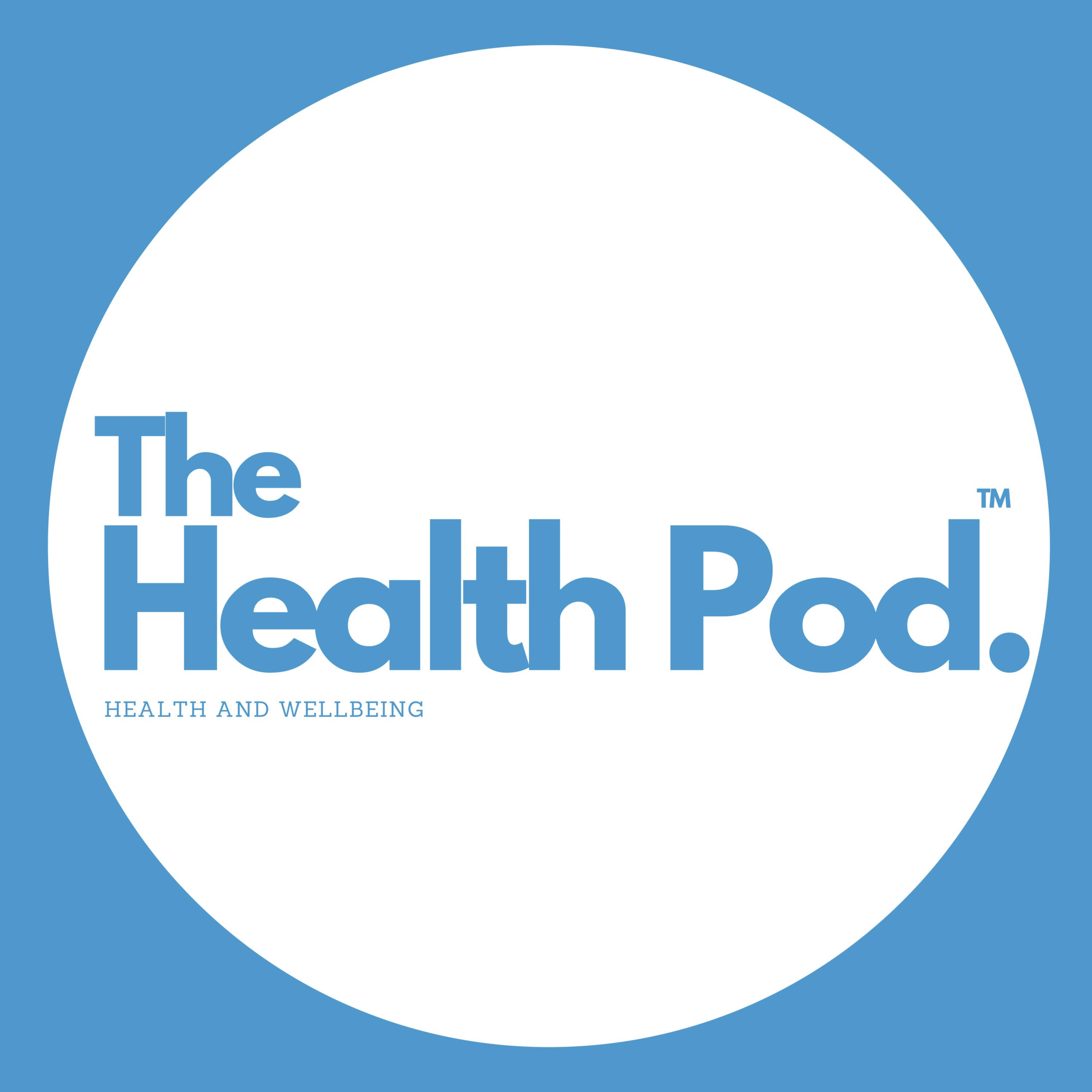Discover The Health Pod
The Health Pod

The Health Pod
Author: Nishi, Malissa, Nimasha and Randila
Subscribed: 0Played: 0Subscribe
Share
© Nishi, Malissa, Nimasha and Randila
Description
Hi everyone! This is a podcast about all things health and wellbeing. It is hosted by four friends, with educational backgrounds in different fields of health. Every first Friday of the month, we post a casual conversation about a trendy health topic in the hopes of sharing evidence-based information. This is because we believe that educating ourselves is the first step to taking control of our own health. Hope you enjoy.
10 Episodes
Reverse
In this episode, we talk about the topic of resilience in a broader context. We refer to the information provided by the Amerian Psychological Association (APA) and other credible research studies to define resilience as it relates to our overall health and to provide context to some of the determinants of resilience. Specifically, we talk about what resilience is, what resilience isn’t, the various factors that affect one's ability to be resilient in life, and finally, the APA recommended strategies to build resilience. To learn more about the information we talk about in this episode, please feel free to access the following resources.
Gibbs' Reflective Cycle: https://www.ed.ac.uk/reflection/reflectors-toolkit/reflecting-on-experience/gibbs-reflective-cycle
American Psychological Association article: “Building your resilience” https://www.apa.org/topics/resilience
Research article titled “Resilience definitions, theory, and challenges: interdisciplinary perspectives” https://www.tandfonline.com/doi/full/10.3402/ejpt.v5.25338
Edited by: Nishi
Graphic designed by: Nishi
In this episode, we talk about the topic of resilience in a broader context. We refer to the information provided by the American Psychological Association (APA) and other credible research studies to define resilience as it relates to our overall health and to provide context to some of the determinants of resilience. Specifically, we talk about what resilience is, what resilience isn’t, the various factors that affect one's ability to be resilient in life, and finally, the APA recommended strategies to build resilience.
To learn more about the information we talk about in this episode, please feel free to access the following resources.
American Psychological Association article: “Building your resilience” https://www.apa.org/topics/resilience
Research article titled “Resilience definitions, theory, and challenges: interdisciplinary perspectives” https://www.tandfonline.com/doi/full/10.3402/ejpt.v5.25338
Edited by: Nishi
Graphic designed by: Nishi
In this episode we talk about Myths skin health that we've heard growing up. Skin is the largest organ of our bodies and it is what's seen from the outside and something we put so much effort so as to ensure it looks good. However, there are some myths about skin health that we've grown up believing which aren't actually true! So Join us with this episode as we debunk these commonly heard myths.
The four main myths we would be discussing are:
1. Healthy skin is skin that looks flawless
2. You only need sunscreen on sunny days
3. People with darker skin don’t need sunscreen
4. Chocolate causes acne
Always remember your skin is unique to you and you alone! Take care of it the right way.
References: Evolving role of skin care https://www.ncbi.nlm.nih.gov/pmc/arti... Effects of exposure to UV light https://www.ncbi.nlm.nih.gov/pmc/arti... Effects of the myth: People with darker skin tones dont need sunscreen https://www.ncbi.nlm.nih.gov/pmc/arti... Relationship between diet and acne https://www.ncbi.nlm.nih.gov/pmc/arti...
In this episode, we talk about how to make healthy habits last. For some the first step of starting the habit is difficult but for others maintaining is difficult. So, if you are someone that finds the latter challenging, these tips are for you! In addition, we also talk about the stages of change theory which identifies the steps all of us take when we are trying to adopt a new behavior. Hope this episode brought you value :)
The five ways to make sure your newly found healthy habits last are:
1) Acknowledge that lapses and relapses are normal.
2) Approach your desired behavior in a realistic step-wise manner (the best way to adopt a new habit is to make small gradual changes over a long period of time)
3) Realize that self-control is a limited resource. So try to limit the number of temptations that you will have to overcome during the day. Limit any barriers that will make you not want to continue your desired behavior.
4) Surround yourself with supportive people. People that have similar goals to your desired behavior.
5) Track your progress and set a date to sit down and assess the data you have collected.
Hope these help :)
------------------------Timestamps for the contents of the video-------------------
00:00 Intro
00:15 Reminder
00:17 Tips to make healthy habits last
26:15 A quick recap
27:18 Outro
-------------------------References---------------------------------------------------------------------
The transtheoretical model of health behaviour change: https://pubmed.ncbi.nlm.nih.gov/10170434/
A ‘Stages of Change’ Approach to Helping Patients Change Behavior: https://www.aafp.org/afp/2000/0301/p1409.html
Goal Setting and Action Planning for Health Behavior Change: https://www.ncbi.nlm.nih.gov/pmc/articles/PMC6796229/
Social cognitive theory-based intervention to promote physical activity among prediabetic rural people: a cluster randomized controlled trial: https://trialsjournal.biomedcentral.com/articles/10.1186/s13063-019-3220-z
Rewire your life: sustaining behavioural change by habit tracking: https://bjsm.bmj.com/content/50/3/193
-------------------------Social Media ---------------------------------------------------------------------
Instagram: the_health_pod (https://www.instagram.com/the_health_pod/)
In this episode, we talk about social media and health. We discuss the effects of social media on physical health and mental wellbeing, the signs of negative social media usage, the pros and cons of social media for the betterment of health and most importantly what you can do to build a healthy relationship with social media. Hope you find value from our content :)
------------------------Timestamps for the contents of the video-------------------
00:00 Intro
00:08 Reminder
00:17 Discussion about social media and health
21:40 A quick recap
23:24 Outro
-------------------------References---------------------------------------------------------------------
https://journals.sagepub.com/doi/full/10.1177/1090198119863768
https://www.helpguide.org/articles/mental-health/social-media-and-mental-health.htm
In this episode, we talk about everyday stress, its manifestations, and most importantly the creative activities that can be implemented to manage stress. This includes things like creative writing, gardening, coloring, dancing, etc. Throughout the entire episode, we provide research evidence to explain how and why such creative activities can be utilized to manage everyday stress.
------------------------Timestamps for the contents of the video-------------------
00:00 Intro
00:10 Reminder
00:22 List of options for stress relief
00:48 What is stress
01:25 Signs and Symptoms of stress
03:33 Meditation
06:36 Pet therapy
07:03 Creative writing and journaling
12:08 Gardening
13:45 Effect of self-efficacy on stress relief
14:48 Making schedules and lists
15:36 Art therapy
17:26 Music therapy
18:18 Dancing and Exercises
20:02 A quick recap
20:55 Outro
-------------------------References---------------------------------------------------------------------
https://www.mentalhelp.net/stress/typ...
https://www.mentalhealth.org.uk/a-to-....
http://www.gruberpeplab.com/teaching/...
https://www.health.harvard.edu/health...
https://www.tandfonline.com/doi/full/...
https://thriveglobal.com/stories/3-su...
https://pubmed-ncbi-nlm-nih-gov.libac...
https://www.forbes.com/sites/jeannecr...
https://www.healthline.com/health/men...
https://www.arthurmurraydancenow.com/....
In this episode, we talk about the importance of sleep and maintaining good sleep hygiene. We also have a candid conversation about our own perceptions about sleep, our current sleep habits, and how and why our sleep schedules have changed over time. Throughout the entire episode, we give evidence-based facts for why sleep is an essential component of our health and wellbeing routine.
--------------- Timestamps for the Contents of this video -----------------------------------------------------------------
00:00 Intro
00:09 Reminder
00:23 Sleep and social environment
06:14 Sleep and caffeine: physiology
08:37 Perceptions about the ideal amount of sleep
09:54 Benefits of Sleep
12:32 Improving your sleep time
13:35 How do you know what your ideal amount of sleep is?
16:05 Circadian rhythm and drowsiness
17:28 Is it okay to nap?
19:49 Sleep hygiene
25:26 A quick recap of the main points
28:30 Outro
--------------- We also talk about the following topics ------------------------------------------------------------------------
- Is sleep a big part of your health and wellbeing routine?
- What is your sleep schedule like and has it changed over time?
- How many hours of sleep do you think you need for optimal performance?
- Is being busy and losing sleep normalized and glorified these days? Why is that?
- What are the benefits of sleep?
- How do you know if you are getting enough sleep?
- How does the practice of napping affect our sleep hygiene?
- What are some things you can do to sleep better at night?
--------------- References -------------------------------------------------------------------------------------------------------------------
https://www.health.harvard.edu/staying-healthy/improving-sleep-a-guide-to-a-good-nights-rest https://www.ncbi.nlm.nih.gov/pmc/articles/PMC6281147/ https://www.health.harvard.edu/newsletter_article/napping-may-not-be-such-a-no-no https://www.sleepfoundation.org/nutrition/caffeine-and-sleep
--------------- Audio Edited By -------------------------------------------------------------------------------------------------------------
Bonnie Tran: IG: @btrran and @bonneats
In this episode, we talk about four popular myths about nutrition and food. The myth that we discuss are:
1. Eating more protein helps you build bigger muscles
2. Carbohydrates are unhealthy
3. Breakfast is the most important meal of the day
4. If the label says no-fat or low-fat, you can eat all you want.
--------------- Timestamps for the Contents of this video -----------------------------------------------------------------
00:00 Intro
00:40 Eating more protein helps you build bigger muscles
15:23 Carbohydrates are unhealthy
31:05 Breakfast is the most important meal of the day
39:49 If the label says no-fat or low-fat, you can eat all you want.
--------------- We also talk about the following topics ------------------------------------------------------------------------
- How should we manage diet and exercise, if we want to build bigger muscles
- reasons behind the importance of fats and carbohydrates for muscle building
- The latest research findings on whether or not proteins alone will help build muscle mass
- Should we focus entirely on decreasing our sugar intake?
- What types of carbs are good and what types should we avoid?
- How can carbs be good for us?
- What are the advantages of having breakfast?
- The link between breakfast and our circadian rhythms.
- Is eating late at night bad for our health?
- What does it actually mean when the food label says "Low fat"
- What happens to your body when you eat too much low-fat food.
--------------- References -------------------------------------------------------------------------------------------------------------------
Myth 1
https://bjsm.bmj.com/content/52/6/376.long
https://www.ncbi.nlm.nih.gov/pmc/articles/PMC4997282/
Myth 2
https://www.health.harvard.edu/diseases-and-conditions/the-lowdown-on-glycemic-index-and-glycemic-load
https://academic.oup.com/fqs/article/1/1/47/4791730
https://www.health.harvard.edu/diet-and-weight-loss/carbohydrates--good-or-bad-for-you
https://pubmed.ncbi.nlm.nih.gov/24388214/
https://www.sciencedirect.com/science/article/pii/S193131281830266X
https://www.heart.org/en/healthy-living/healthy-eating/eat-smart/nutrition-basics/carbohydrates
https://atlasbiomed.com/blog/what-are-short-chain-fatty-acids-and-why-should-you-care/
Myth 3
https://www.webmd.com/food-recipes/breakfast-lose-weight#1
https://www.bbc.com/future/article/20181126-is-breakfast-good-for-your-health
https://scholar.google.com/scholar?hl=en&as_sdt=0%2C5&q=eating+late+at+night+&btnG=
Myth 4
https://www.ncbi.nlm.nih.gov/pmc/articles/PMC4742721/
https://www.ncbi.nlm.nih.gov/pmc/articles/PMC6794740/
https://www.ncbi.nlm.nih.gov/pmc/articles/PMC5573644/
https://www.healthline.com/nutrition/how-to-read-food-labels#misleading-claims
In this episode, we talk about four popular myths about physical activity and/or exercise. The myth that we discuss are:
1. Warm-ups and cool-downs are not important
2. You must feel sore after every workout
3. Restricting the calories you eat is the best way to lose weight
4. Crunches are the best way to lose belly fat
In addition, we also talk about the following topics:
- The physiological changes that take place when you warm-up and how they benefit you.
- The latest research findings on whether or not cooldowns are important.
- Why we feel sore after a workout.
- How do you know when to step up your workout to improve your fitness?
- Consequences of pushing through a workout when you are feeling extremely sore.
- Three main components you need to consider when starting a weight loss journey to achieve.
- How we form fat cells in our body.
- What types of foods to focus on if you want to decrease your calorie or food intake.
- What types of movements and exercises to focus on to lose weight to reach a healthy weight range.
- How to work with the hormonal changes to reach an optimum weight range in a healthy and safe manner.
- Can we do the same exercises to lose belly fat and get toned muscles?
- Why we are not able to reduce fat from specific areas of our body; why spot reduction exercises do not work.
Contents of this video:
00:00 - Intro
02:12 - Myth #1: Warm-ups and cool-downs are not important
11:37 - Myth #2: You must feel sore after every workout
23:30 - Myth #3: Restricting calories is the best way to lose weight
35:05 - Myth #4: Crunches make you lose belly fat
46:07 - Outro
This is a short intro where we talk about the purpose of our podcast.







